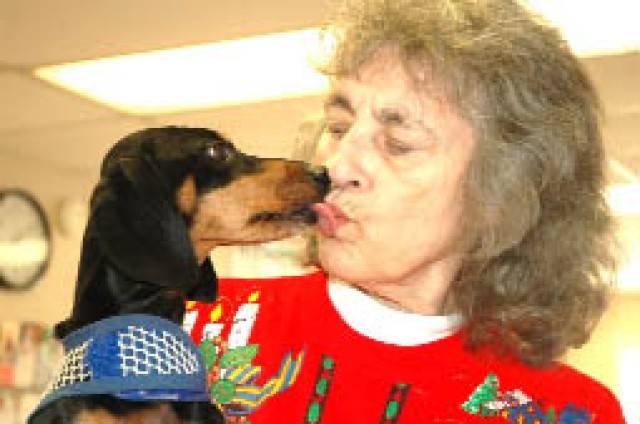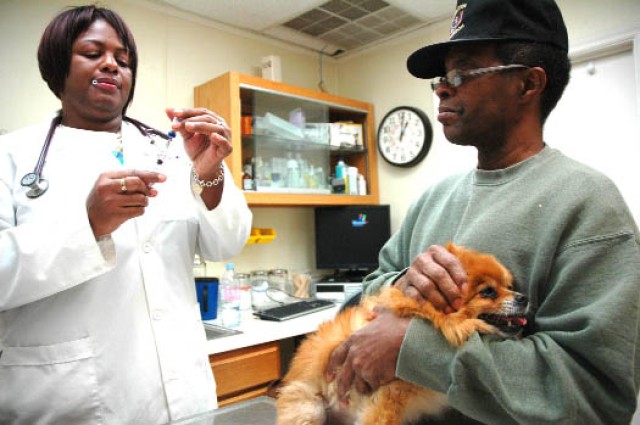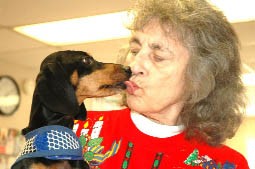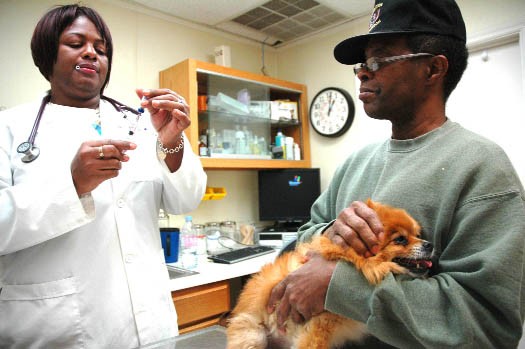FORT MCPHERSON, Ga. -- Although retired, her life is still pretty hectic taking care of her nine children, who she knows will never leave the nest. After living with such children for 50 years, it isn't a burden, but a blessing.
"It's very interesting; never a dull moment," said Rhea McBride, as her "daughter" Ollie, 7, kisses her. Ollie, like her eight other relatives, is a Dachshund who has filled a special void in McBride's life.
When her "human babies" left the nest after growing up, the dogs became her adopted children, and like her real children, keeping them safe and healthy is a major concern for the former Morale, Welfare and Recreation employee.
To help enhance the quality of life and ensure their health, McBride turns to the staff of the Fort McPherson Veterinary Treatment Facility (VTF).
The facility, although small when compared to some of the grandiose buildings on post, plays a large role in easing the concerns and worries of area pet owners, of which there is a shortage, said Dr. Na-te McFarlane, a VTF veterinarian.
"We're pretty steady," she said of the workload, estimating she sees around 30 pets a day on average.
McFarlane said many of the customers, like McBride, are retirees. Because many retirees' children have moved out, she said many adopt pets in their place.
One such customer, Gilbert Rose, a retired staff sergeant, is living proof of McFarlane's statement.
"When my kids moved away, they became my kids," he said of his two Pomeranians, Baby, 9, and Teddy, 7.
The two, along with their "dad", came to the clinic Tuesday for a routine checkup and shots. Routine shots offered by the clinic include rabies, canine distemper and canine cough, among others, said Capt. Margaret Carl, Fort McPherson VTF officer in charge.
She added the clinic also offers veterinary examinations; health certificates for airline, interstate, or international travel; blood work and minor surgeries, such as spays and neuters.
The clinic also stocks a variety of medications, including heartworm preventive, flea and tick control products and some therapeutic shampoos.
"If we do not have something in stock, we can, in some cases, order it or provide a prescription to a local pharmacy," Carl added.
All of the services, whether administered at the clinic, like vaccines or take home services, like pet medicines, are designed to help enhance a pet's quality of life and life span.
Like human-based medical advances, improvements in pet medicine have helped relieve illnesses and ailments that once could have proven fatal or detrimental, McFarlane said. "Common diseases, like arthritis, can be treated. With management we can give them (the animals) a better quality of life," McFarlane explained.
Such management is necessary because there are a lot of health hazards in the area, McFarlane said. These include fleas, dermatitis, heartworm and dental issues.
Besides keeping pets safe, treatment is also beneficial for the owner, as most of these diseases are zoonotic, or can be passed from animal to humans, McFarlane said.
Pet owners should also maintain a relationship with a veterinarian off post, as the post cannot perform certain tasks, such as X-rays, ultrasounds and major surgeries, McFarlane said. Following all this advice and getting routine shots will add quality years to the life of a pet, McFarlane said. Regular exercise and a healthy diet are also important, both Rose and McBride said.
"Give them (pets) all the love you can give them," McBride said. "Spoil them" "I can't see myself without them," Rose added as he pet Baby.




Social Sharing